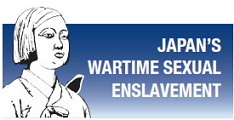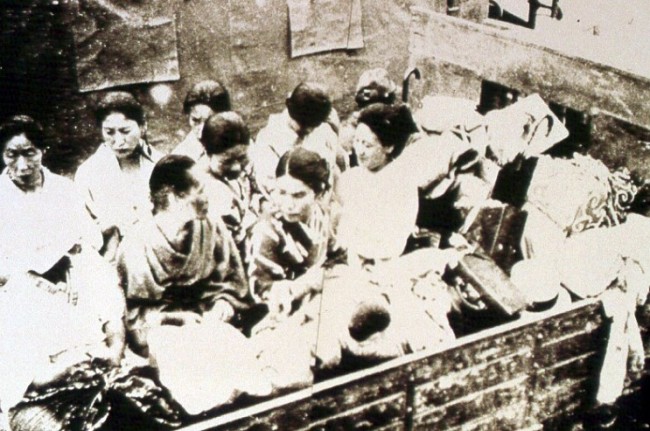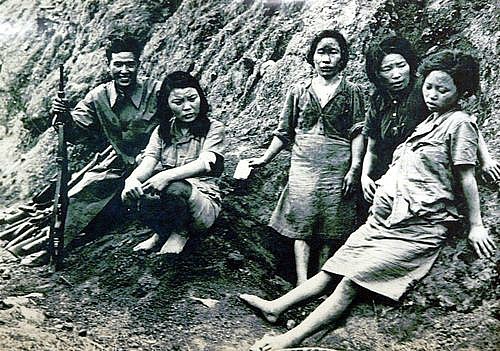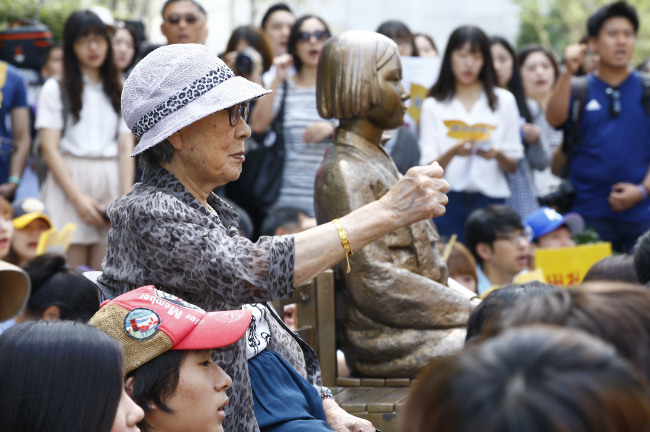The following is the 11th and last in a series of articles on Japan’s wartime sexual enslavement of Asian women on the occasion of the 61st anniversary of the foundation of The Korea Herald on Aug. 15. ― Ed.
Despite pressing needs and ongoing diplomatic negotiations, prospects for an end to the tragedy of the “comfort women” remain dim in the face of Tokyo’s tenaciously defiant attitude toward wartime history and other hostile political and social circumstances.
 The two countries have since April held four rounds of talks to explore ways to resolve the festering feud. Korea demands Japan accept its legal responsibilities and provide compensation to the victims and their families, while Tokyo argues that its liabilities have already been cleared through a 1965 pact that normalized bilateral ties and other multilateral accords.
The two countries have since April held four rounds of talks to explore ways to resolve the festering feud. Korea demands Japan accept its legal responsibilities and provide compensation to the victims and their families, while Tokyo argues that its liabilities have already been cleared through a 1965 pact that normalized bilateral ties and other multilateral accords.
Negotiations are set to kick into high gear as Japan is believed to have presented a proposal at the latest meeting in Tokyo last week. Korea calls for “concrete and viable” measures that can be accepted by the victims of Japan’s sex slavery during World War II.
In 2012, the two countries floated some ideas to end the dispute including the so-called Sasae formula. Proposed by then-Japanese Vice Foreign Minister Kenichiro Sasae, the package consists of a letter to the victims by the prime minister, a face-to-face apology by the Japanese ambassador to Korea, and redress as humanitarian measures.
A senior lawmaker serving on the foreign affairs and unification committee at the parliament said early this week that the Shinzo Abe government was considering writing a letter and offering living expenses to the survivors. But Japan’s Chief Cabinet Secretary Yoshihide Suga flatly denied the plan.
Many officials and experts here see any offer similar to the Sasae formula, born under the leadership of Yoshihiko Noda of the Democratic Party, to be unlikely. Abe has long harbored revisionist historical views and is pushing for a range of hawkish security and territorial policies, which has further dampened the country’s relations with Korea and China.
Since its inception in December 2012, his administration has refuted the forcible nature of the mobilization of the comfort women. It undertook a review of the watershed 1993 apology issued by then-Chief Cabinet Secretary Yohei Kono, concluding in July that it was not possible to verify that the women were forcefully drafted.
Despite pressing needs and ongoing diplomatic negotiations, prospects for an end to the tragedy of the “comfort women” remain dim in the face of Tokyo’s tenaciously defiant attitude toward wartime history and other hostile political and social circumstances.
 The two countries have since April held four rounds of talks to explore ways to resolve the festering feud. Korea demands Japan accept its legal responsibilities and provide compensation to the victims and their families, while Tokyo argues that its liabilities have already been cleared through a 1965 pact that normalized bilateral ties and other multilateral accords.
The two countries have since April held four rounds of talks to explore ways to resolve the festering feud. Korea demands Japan accept its legal responsibilities and provide compensation to the victims and their families, while Tokyo argues that its liabilities have already been cleared through a 1965 pact that normalized bilateral ties and other multilateral accords. Negotiations are set to kick into high gear as Japan is believed to have presented a proposal at the latest meeting in Tokyo last week. Korea calls for “concrete and viable” measures that can be accepted by the victims of Japan’s sex slavery during World War II.
In 2012, the two countries floated some ideas to end the dispute including the so-called Sasae formula. Proposed by then-Japanese Vice Foreign Minister Kenichiro Sasae, the package consists of a letter to the victims by the prime minister, a face-to-face apology by the Japanese ambassador to Korea, and redress as humanitarian measures.
A senior lawmaker serving on the foreign affairs and unification committee at the parliament said early this week that the Shinzo Abe government was considering writing a letter and offering living expenses to the survivors. But Japan’s Chief Cabinet Secretary Yoshihide Suga flatly denied the plan.
Many officials and experts here see any offer similar to the Sasae formula, born under the leadership of Yoshihiko Noda of the Democratic Party, to be unlikely. Abe has long harbored revisionist historical views and is pushing for a range of hawkish security and territorial policies, which has further dampened the country’s relations with Korea and China.
Since its inception in December 2012, his administration has refuted the forcible nature of the mobilization of the comfort women. It undertook a review of the watershed 1993 apology issued by then-Chief Cabinet Secretary Yohei Kono, concluding in July that it was not possible to verify that the women were forcefully drafted.


The Kono Statement acknowledged and apologized for operating “comfort stations” and forcing women to provide sex to the Imperial Japanese Army during World War II.
“Given the Abe government’s backpedaling, we are facing greater difficulty drawing up a resolution. The director-general-level talks will tread a long, rough path,” a Seoul official said on condition of anonymity due to the sensitivity of the matter.
Scholars warned of a hasty political bargain, however, stressing the need for thorough and cautious preparations.
“Compromises similar to the Kono Statement or the Asia Women’s Fund will likely stir substantial backlash. They also run counter to Korea’s official stance,” said Seo Hyun-ju, a research fellow at the Northeast Asian History Foundation.
“The comfort women make a rare case in which state involvement in sexual violence in conflict is proved considerably clear. So the way this issue is tackled could be a yardstick for the resolution of similar issues that may emerge in the future elsewhere.”

Even in Seoul, controversy persists over whether compensation should be provided by Japan. Some officials and experts say that the Korean government can cover the part in light of the 1965 agreement, while others regard monetary support from Japan’s state coffers as a key indication of taking legal responsibility.
Despite the widespread view on Japan’s legal responsibility, some observers also argue that stipulating “government-level” accountability will be more legitimate and realistic given past agreements.
Among other challenges is how to ensure that no Japanese officials will negate or water down the ultimate resolution as they had often done at the parliament or news conferences.
When the Sasae formula was being discussed, Korea called for a guarantee that Japanese officials or politicians would not publicly disavow the deal, according to diplomats who were involved in the process. But Japan could not deliver a promise and the negotiations fell apart.
Similarly, Tokyo may demand an agreement that any new deal would be the last and resolve the sex slavery dispute once and for all, which would likely complicate Seoul’s efforts to convince and assuage the victims, their families and civic groups supporting them.
Japan could also push to put an end to other longstanding rows, such as those over Korean atomic bomb victims and Sakhalin Koreans who were forced into hard labor during the Sino-Japanese War, which Seoul says were not settled through the 1965 accord.
Hopes are growing for a thaw in the relationship in recent weeks as Seoul appears to be sending out reconciliatory signals. Early this month, Korea organized the first trilateral deputy-minister-level dialogue with Japan and China since November, and Foreign Minister Yun Byung-se met with Japanese Ambassador Koro Bessho for their first one-on-one talks since he took office last year.
Some observers say that despite pervasive perceptions over a hard-line Abe, he could exert political power and make concessions, citing Prospects dim for end to sex slavery feud
Japan’s tradition of pragmatism and his desire for a summit with President Park Geun-hye.
But another Seoul official offered a bleak outlook, saying the comfort women issue “doesn’t look like an area of flexibility for Abe. It is more about principles and belief than pragmatism.”
Another prime driving force is growing calls for Tokyo’s resolution in the international community. Vexed by unabated tension between its two top regional allies, the U.S. has been heaping pressure on the Abe administration, while the U.N. and other multinational agencies are stepping up criticism over its unrepentant attitude.
Seoul, for its part, faces pressure for legacy in foreign policy and practical needs for a thaw with Tokyo as the Park presidency is inching closer to the end of its second year.
“Diplomacy is all about compromise, but we will not make any unripe compromise on this one,” another senior Seoul official said on customary condition of anonymity.
“We are sticking to our position that Japan should make sincere efforts and formulate measures that are acceptable to the sex slavery victims from the standpoint that one who created the problem should solve it.”
By Shin Hyon-hee (heeshin@heraldcorp.com)



![[Exclusive] Korean military set to ban iPhones over 'security' concerns](http://res.heraldm.com/phpwas/restmb_idxmake.php?idx=644&simg=/content/image/2024/04/23/20240423050599_0.jpg&u=20240423183955)
![[AtoZ into Korean mind] Humor in Korea: Navigating the line between what's funny and not](http://res.heraldm.com/phpwas/restmb_idxmake.php?idx=644&simg=/content/image/2024/04/22/20240422050642_0.jpg&u=)




![[Graphic News] 77% of young Koreans still financially dependent](http://res.heraldm.com/phpwas/restmb_idxmake.php?idx=644&simg=/content/image/2024/04/22/20240422050762_0.gif&u=)
![[Herald Interview] Why Toss invited hackers to penetrate its system](http://res.heraldm.com/phpwas/restmb_idxmake.php?idx=644&simg=/content/image/2024/04/22/20240422050569_0.jpg&u=20240422150649)




![[Exclusive] Korean military to ban iPhones over security issues](http://res.heraldm.com/phpwas/restmb_idxmake.php?idx=652&simg=/content/image/2024/04/23/20240423050599_0.jpg&u=20240423183955)



![[Today’s K-pop] Ateez confirms US tour details](http://res.heraldm.com/phpwas/restmb_idxmake.php?idx=642&simg=/content/image/2024/04/23/20240423050700_0.jpg&u=)